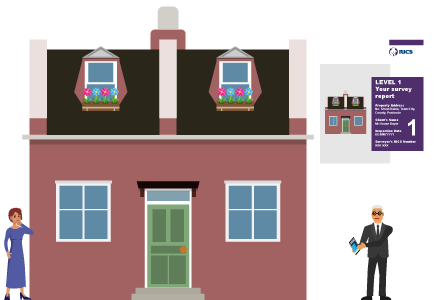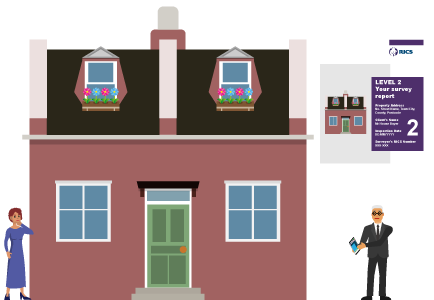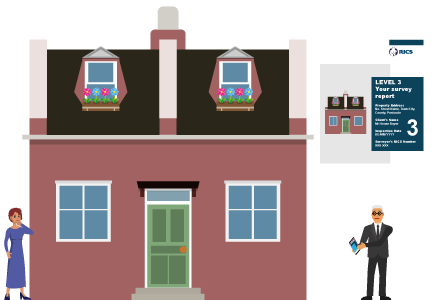Finding a house surveyor is one of the key steps that property buyers often take before committing to the sale.
It’s also fairly common for existing homeowners to instruct a surveying expert when planning to sell. Also if they have any intentions to undertake renovation work or extend.
In this article, the team at Property Solvers delves into the surveying process. We look into the types of survey available, instructing a professional and how to find the best firm.
What Does A Surveyor Do?
A property surveyor is a qualified professional who assesses the condition of residential and commercial properties.
Their work includes physically assessing the property and providing a detailed report that runs through the building’s structure, legal boundaries and overall condition.
Surveyors examine various parts of a property such as its structural integrity alongside the roof, ceilings, walls and permanent outbuildings (where they exist) amongst many other aspects.
In the UK, most surveys are undertaken by a qualified professional from the Royal Institute of Chartered Surveyors (RICS). Homebuyers, sellers and owners can also opt to instruct someone accredited with The Residential Property Surveyors Association (RPSA).
Types of Surveys
Different surveys can be chosen depending on how detailed the buyer, seller or homeowner wants to go:
RICS Home Survey (Level 1)
A Level 1 report is the most basic survey offered by RICS.
It’s a popular choice among homebuyers who want to know about any significant risks or urgent defects but don’t need a full structural breakdown of the property. Check out a sample here.
RICS Homebuyers Survey (Level 2)
A mid-level Level 2 survey that’s also referred to as a Home Buyer Report.
This is a standard option for many buyers and covers everything of the Level 1 report, but it also involves a check of roof spaces and cellars and offers recommendations. Plus, there’s the option to add a valuation to the report. Check out a sample here.
RICS Home Survey (Level 3)
This is a full structural survey, previously called a RICS Building Survey. The “Level 3” report is the most comprehensive (and expensive) option.
Ideal for older properties or homes that would require larger renovations, the report involves a close inspection of potential or hidden defects.
There is also an in-depth analysis of structural integrity, including underlying movement and any issues with drainage services or boundary walls.
Visible (patent) issues, potential future risks and safety concerns are also identified alongside specific details of the work needed to repair them. Check out a sample here.
Mortgage Valuation
Often required by mortgage lenders, this survey focuses more on the market value of the property. While it is not as detailed as other surveys, it ensures the property’s value aligns with the loan amount.
Snagging Survey
Conducted for new-build homes, this survey identifies defects or issues that developers need to address before the buyer moves in.
What Does a Surveyor Do in Your House?
When conducting a house survey, surveyors check various elements of the property. Whilst much will depend on the type of survey, these include:
Visual Inspection
Surveyors visually inspect accessible areas such as the roof space, walls, central heating, and bathroom fittings to identify visible defects or damage.
Main Services
They assess the condition of the property’s main services (particularly for any issues or safety concerns) including electrical systems, gas central heating, plumbing and drainage services.
Construction Material
If the property is non-standard construction, for example, it may be classed as unmortgageable.
Structural Movement
Qualified surveyors look for cracks, subsidence or other structural movement that may compromise the property’s condition.
Environmental Impact Rating (EIR)
The survey may include an assessment of the local environment, considering factors such as traffic noise, flood risks or nearby industrial activity.
Building Regulations and Planning Permission
The surveyor’s report may identify whether any extensions or modifications comply and have the necessary planning permission.
Relevant Safety Certificates
This is to ensure the property has the required safety certifications, such as for gas and electrical systems.
Roof Checks
The surveyor will usually enter the roof cavity with a torch to examine its overall condition including structural timbers, tiling, impermeability, flashing and other elements.
Threatening Trees or Invasive Vegetation
The house survey will confirm if any roots slowly creeping towards a house can cause potentially serious structural issues.
Japanese Knotweed, bamboo, Himalayan balsam and an intensive presence of ivy can also be cause for concern if not treated correctly.
Boundary Walls and Legal Issues
The survey may identify legal issues related to property boundaries or disputes that need resolution before exchanging contracts. Structural work done without planning permission
Hazardous Material
Scan the property for materials that could be dangerous such as asbestos.
Damp Concerns
The surveyor can examine if there are any signs of rising damp (distinct from codensation) alongside the presence of a Damp Proof Course.
What Does A Surveyor Do When Buying A House?
During the buying process, a house survey can be a key indicator of any issues of concern.
A property surveyor provides peace of mind by identifying issues before exchanging contracts, offering buyers the chance to renegotiate the price or request repairs.
If the surveyor suspects serious problems, they might recommend further explanation or more detailed investigations. This ensures that buyers are aware of any risks tied to the condition of the property.
Surveyors use a standardised condition rating system to highlight areas that need immediate attention, further investigation or maintenance.
Will I Get a Valuation with My Survey Report?
The final report may also include an impartial valuation – often at an extra cost.
Here the survey will take a detailed look at sold properties similar (in terms of size, condition, location etc.) to yours.
He/she will also examine the sales market for properties sold subject to contract (SSTC) or under offer, speaking to local estate agents as needed.
It’s worth noting that most house surveyors will take a conservative approach to valuations. This is often because being over-confident can backfire with changes in the market, protecting the mortgage lender’s interest or other perceived risks.
What Does A Surveyor Do When Selling A House?
For home sellers, understanding what a house surveyor does is essential to prepare for the sale process and avoid potential setbacks.
A surveyor’s findings can significantly influence the buyer’s perception of the property. Even if the property is sold subject to contract, the mortgage lender’s surveyor may downvalue it to account for unresolved issues.
Addressing common issues found in a survey before marketing a property can therefore help sellers avoid delays or price renegotiations.
How Can I Find a Surveyor?
There are a few ways to instruct a surveyor…
- A Google or Chat GPT search for local surveyors
- Use Property Solvers’ own comparison tool
- Some buyers approach the mortgage lender to offer a building survey alongside the valuation (and pay any extra costs)
- Ask mortgage brokers, conveyancers or insurance protection advisers may offer recommendations.
Choosing the Right Surveyor
We recommend selecting a chartered surveyor affiliated with professional bodies like RICS or RPSA.
This will ensure that the instructed professional conduct the survey to the highest standards.





